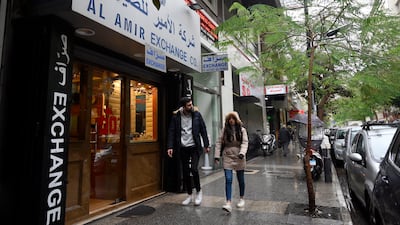Business conditions in Lebanon's private sector improved marginally in January as output and new orders declined at a slower pace, although the economy continues to be held back by politicians' inability to agree on the enactment of reforms and the election of a new president.
The country's Blom purchasing managers' index, a measure of the strength of its private sector, rose to 47.7 in January, from 47.3 in December, marking the highest reading recorded since October last year.
A reading above 50 denotes economic expansion and one below 50 represents a contraction.
“The situation in Lebanon is deeply troubling and reflects the dire circumstances that many people in Lebanon are currently facing,” said Stephanie Aoun, research analyst at Blominvest Bank.
While most indicators were leading to further deterioration in the private sector after the holiday season, the PMI jumped, mainly driven by unexpected increases in output and new orders, she said.
“In fact, a severe depreciation in the domestic currency against the US dollar drove private sector businesses to raise their prices in January,” Ms Aoun.
“Furthermore, starting February 1, Lebanon's central bank will likely adopt an exchange rate of 15,000 Lebanese pounds per US dollar as part of a process to unify the country's multiple exchange-rate system, which could further increase liquidity and prices.”
Lebanon, which is in the grip of its worst economic crisis in decades, continues to suffer from hyperinflation, which hit 122 per cent in December, compared with the same month a year earlier.
Inflation surged to 171.2 per cent in 2022, the highest in nearly four decades, according to official data.
The country was expected to post the second-highest inflation rate in the world last year, behind Sudan, according to Fitch Solutions.
Politicians are deadlocked over the formation of a new cabinet eight months after parliamentary elections were held and after the six-year term of former president Michel Aoun expired at the end of October.
In a recent research note, Goldman Sachs said the cost of the ongoing presidential vacuum on the Lebanese economy is “likely to delay already lagging reform efforts and progress on the International Monetary Fund's prior actions”.
In September, the IMF called on Lebanese authorities to put in place critical structural and financial reforms, a prerequisite to securing $3 billion of assistance from the lender that is expected to help the country emerge from the economic crisis.
Securing IMF backing would help to unlock a further $11 billion of assistance that was pledged at a Paris donor conference in 2018, which is also tied to a number of reforms.
Business activity in Lebanon's private sector declined at the start of the year amid challenging domestic market conditions linked to political and economic uncertainty, the survey results show.
However, the drop in output levels was slower than in the previous month.
Foreign client demand deteriorated to its weakest since September while spare capacity rose as a result of lower work backlogs. Companies reduced staff levels amid lower business activity.
According to the companies surveyed, a worsening exchange rate against the US dollar put pressure on company margins. Overall input price inflation rose to an 18-month high in January.
“Unfortunately, as economic and political things stand today, the outlook for a future, badly-needed improvement remains grim,” Ms Aoun said.
Lebanon's crisis has been described by the World Bank as one of the worst in modern history, leading to a surge in unemployment, with more than half the population sliding below the national poverty line and many more leaving the country.


